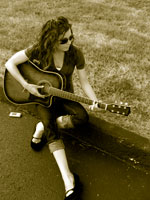A Need for Order | 7.1 Author Lindsey DeLoach Jones
Trevor Sutton
 7.1 Author Lindsey DeLoach Jones talks rituals and the need for order.
I like my drinks very, very cold.
7.1 Author Lindsey DeLoach Jones talks rituals and the need for order.
I like my drinks very, very cold.
A plastic tumbler, 6 ice cubes, and a can of Diet Coke chilled at least twenty-four hours in a 35-degree refrigerator. Limit one per day.
Occasionally, I joke about being obsessive compulsive or a control freak or both, but I’m neither of these things really.
Maybe it’s the pressure to confront the veiled chaos of the blank page or the daily, private rumpus of my soul. Maybe it’s the anger I hear already in the voice of my one-year-old daughter, anger I didn’t put there and can’t control. Something compels me to keep a very few things in a very particular order.
Writers need ritual, I tell myself. We look for order everywhere, but it often seems in short supply. And so the soda-slush that predictably forms on the ice cubes in my cup are a solace. Order is present, at least, within the insulated confines of my preferred chalice.
A few other things compel this same rigidity: the temperature of the house at night (so cold my husband pleads for just one extra degree), my position on the sofa in front of the television, the relative greenness of my morning banana. It is a ceremonial pleasure to peel back the skin of a banana and find fruit suitably firm and tart.
My inflexibility embarrasses me. My husband should not come home from the grocery store beaming, having found an entire bunch of bananas for me “so green they’re practically neon.” People all over the world would love to eat a mottled yellow banana, drink a lukewarm soda.
How do I know the difference between a tradition that serves something greater than me – the ritual “confession of sin” we make in our church service between hymns numbers 2 and 3 – and a tradition I have begun to serve? Have I become a slave to my man-made rituals?
At 7:30 every evening, before my husband and I sit down to dinner, I zip up my daughter in a sleep sack, spin the volume dial on the sound machine that sits on the floor of her room with my big toe, and push her hair from her forehead before leaving the room. This liturgy is her safety.
And yet soon, she will need to learn to sleep without the sack, without the sound machine, and – one day – without me.
I can excuse the custom Diet Coke experience, for now, can’t I? I can pray that when I am called, perhaps I will be ready to move from ritual into the wild, where lives tepid soda and mushy bananas.
Lindsey DeLoach Jones is author of "Cutting Our Fingernails" in issue 7.1 of Relief.


